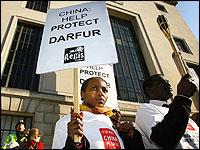Transcript
An organization called Dream for Darfur is trying to save lives by branding the Beijing Games the "Genocide Olympics." The group wants China to use its ties with Sudan to pressure the country into allowing peacekeepers into Darfur.
But “Genocide Olympics” is a hard sell, and executive director Jill Savitt says that Dream for Darfur launched its campaign last summer much more gently.
JILL SAVITT:
We decided to start with a more polite approach and to ask nicely. Throughout the campaign we've targeted a lot of different stakeholders in the Olympics, and we've always tried to start by giving folks an opportunity to do the right thing.
BROOKE GLADSTONE:
One of your early mottos was, "Bring the Olympic dream to Darfur."
JILL SAVITT:
Yes. It was prefaced by, "China, please bring the Olympic dream to Darfur." So we really were committed to asking nicely. But also, in a campaign you don't give yourself anywhere to go rhetorically if you start at “Genocide Olympics.”
BROOKE GLADSTONE:
But you're there now. How did you get there?
JILL SAVITT:
Well, we were always going to go there. It's actually a term created by a Washington Post editorial writer who did an editorial in December of '07 called "Genocide Olympics."
BROOKE GLADSTONE:
And yet, you credit Nick Kristof of The New York Times for applying it to you.
JILL SAVITT:
Yeah. He did a column in January, and it was a little before we had anticipated using the term ourselves, and in the column he called us the Genocide Olympics Campaign and gave our Web address. It prompted us to move a little more quickly, which is a bit funny, because we've been using the media as a prod [LAUGHS] for a lot of our targets, and then we also were prodded.
BROOKE GLADSTONE:
And you've compared your strategy to a presidential campaign.
JILL SAVITT:
What we did at the very beginning was made a list of all the Olympic stakeholders. So there was athletes, the corporate sponsors, the International Olympic Committee and the National Olympic Committee, which is the United States Olympic Committee, and then, of course, there were policymakers in the media, and we had a specific strategy for reaching out to each one.
There's going to be the official torch coming to the United States on April 9th in San Francisco, so there'll be a whole bunch of t-shirts and placards and actually billboard trucks associated with that.
At other Olympic Torch relay events, one might see a helicopter being trailed by a banner with the message on it. So that's how it's like, I think, a political campaign. We were created for one purpose, which was to use the Olympic Games as leverage to change China's policy on Darfur. And we will disband after the Olympics.
BROOKE GLADSTONE:
Are you worried about the fact that the Olympics already has a brand, a pretty positive one that you're sullying up with your message of death and genocide?
JILL SAVITT:
Well, I would make the argument that we're trying to save the Olympics and it's Beijing that's sullying the Games. We believe in the Olympics. We are staunchly anti-boycott. In fact, we're committed multi-lateralists who believe that the Olympics is perhaps one of the last international events and forums that people still like.
It's China that is hypocritical in this regard, because they are using the Olympics as a propaganda campaign at the same time that they are underwriting a genocide.
BROOKE GLADSTONE:
How is it going? Do you think the branding is working? Are people putting Olympics and genocide together in the way that you would like them to?
JILL SAVITT:
Well, I do think so. When we started out, we knew we had an uphill battle in saying somehow that the Olympics and China were related to Darfur when so many people didn't even know where Darfur was. So I do think we have made this association and it has stuck.
But to be very frank with you, that's not our goal. Our goal is not to build equity in this brand. It's to get security on the ground in Darfur. And in that regard, I have to sadly admit that we're not succeeding.
BROOKE GLADSTONE:
Jill, thank you very much.
JILL SAVITT:
Thanks so much.
BROOKE GLADSTONE:
Jill Savitt is the executive director of Dream for Darfur, profiled in this weekend's New York Times Magazine.
